The Wine Industry Award Pay Guide provides essential information on minimum pay rates, classifications, and allowances for employees in the wine sector, ensuring fair compensation and compliance with regulations․
1․1 Overview of the Wine Industry Award
The Wine Industry Award is a regulatory framework governing employment conditions in the wine sector․ It outlines minimum pay rates, classifications, and allowances for employees, ensuring fair compensation․ The award applies to various roles, from vineyard workers to winemakers, and covers regional variations․ Compliance with the award is essential for employers to maintain legal standards and provide equitable pay structures across the industry․
1․2 Importance of Understanding Pay Rates in the Wine Industry
Understanding pay rates in the wine industry is crucial for ensuring fairness, transparency, and compliance with legal standards․ Accurate knowledge of pay structures helps employers avoid underpayment and employees advocate for their rights․ It also promotes equitable compensation across roles, fostering a motivated workforce and maintaining industry integrity․ Staying informed about pay rates is essential for attracting and retaining skilled labor in this competitive sector․
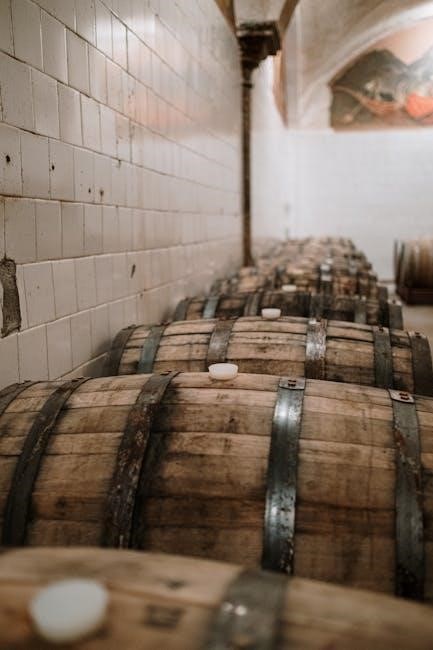
Key Elements of the Wine Industry Award
The Wine Industry Award outlines minimum pay rates, role classifications, and allowances, ensuring fair compensation and compliance with industry standards for all employees in the wine sector․
2․1 Classification of Roles and Positions
The Wine Industry Award classifies roles based on duties, skills, and experience, ensuring fair pay structures․ Positions range from entry-level vineyard workers to senior winemakers, with clear distinctions in responsibilities and corresponding pay grades․ This classification system promotes transparency, accountability, and equity, allowing employers to align roles with industry standards and employees to understand their entitlements clearly․
2․2 Minimum Pay Rates and Allowances
The Wine Industry Award specifies minimum pay rates for all roles, ensuring employees receive fair base pay․ These rates vary based on job classification, experience, and location․ Allowances are additional payments for specific work conditions, such as overtime, shift work, or specialized tasks․ The guide outlines these entitlements to ensure employers meet legal obligations and employees receive accurate compensation for their work․
2․3 Overtime and Penalty Rates
Overtime rates apply to hours worked beyond standard shifts, typically at 1․5 times the base rate for weekdays and 2 times for weekends․ Penalty rates are added for work on public holidays, evenings, or night shifts․ These rates ensure fair compensation for less desirable working conditions․ The Wine Industry Award also specifies minimum engagement periods for casual employees to qualify for penalty rates, ensuring transparency and fairness for all workers․
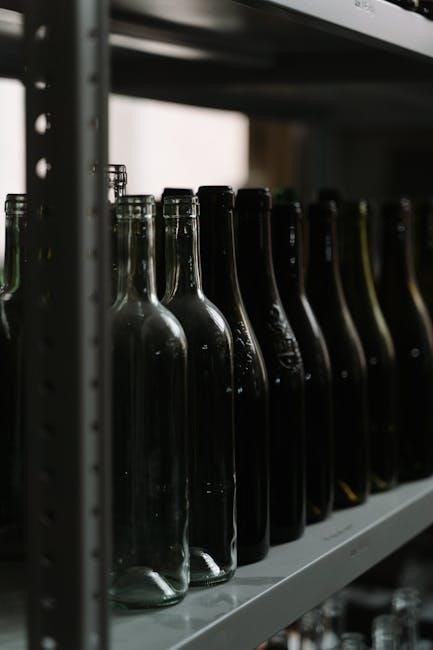
Pay Rates by Job Role
Pay rates vary across vineyard workers, winemakers, sales staff, and management, reflecting roles, responsibilities, and qualifications․ Experience and location also influence earnings, ensuring fair compensation alignment․
3․1 Vineyard Workers and Laborers
Vineyard workers and laborers are classified based on tasks such as pruning, harvesting, and general maintenance․ Minimum pay rates are set by the Wine Industry Award, with hourly rates varying by experience and location․ Employers must adhere to these standards, ensuring fair compensation for physical labor․ Additional allowances may apply for specific conditions, such as working in remote areas or handling hazardous materials․ Always refer to the latest pay guide for accurate details․
3․2 Winemakers and Production Staff
Winemakers and production staff oversee the winemaking process, from fermentation to bottling․ Their pay rates under the Wine Industry Award are determined by experience, qualifications, and seniority․ Entry-level roles start at lower rates, while experienced winemakers receive higher compensation․ Allowances may apply for shiftwork, overtime, or specialized tasks․ Employers must ensure compliance with the Award to avoid underpayment and maintain fair labor practices within the wine production sector․
3․3 Sales and Marketing Roles
Sales and marketing roles in the wine industry, such as wine sales representatives and marketing coordinators, are crucial for brand promotion and revenue growth․ Their pay rates under the Wine Industry Award vary based on experience, location, and specific responsibilities․ Commission structures and bonuses are common in sales roles, while marketing positions may offer fixed salaries with performance-based allowances․ Employers must ensure compliance with the Award to provide fair and competitive compensation․
3․4 Management and Supervisory Positions
Management and supervisory roles in the wine industry, such as winery managers or cellar door supervisors, typically receive higher pay rates due to their leadership responsibilities․ Rates are determined by experience, qualifications, and the scope of duties․ Allowances may apply for overtime, technical skills, or specialized knowledge․ Employers must adhere to the Wine Industry Award to ensure fair and competitive compensation for these critical roles, maintaining compliance with legal requirements․
Factors Affecting Pay Rates
Pay rates in the wine industry are influenced by location, experience, qualifications, industry demand, and market conditions, ensuring fair and competitive compensation across roles․
4․1 Location and Regional Variations
Pay rates in the wine industry vary significantly by location, with urban areas often offering higher wages than rural regions due to differing living costs and demand․ Regional variations also influence salaries, as local market conditions, labor availability, and economic factors shape compensation levels․ Employers must consider these geographical differences to ensure fair and competitive pay structures across diverse areas․
4․2 Experience and Qualifications
Experience and qualifications significantly influence pay rates in the wine industry․ Employees with advanced skills, certifications, or specialized knowledge, such as winemaking expertise or management credentials, typically earn higher wages․ Roles requiring specific qualifications, like viticulturists or cellar managers, often command premium pay․ As employees gain experience, they progress through pay grades, reflecting their increased expertise․ Stay updated with industry standards to justify salary adjustments and ensure fair compensation aligned with individual capabilities and contributions․
4․3 Industry Demand and Market Conditions
Industry demand and market conditions significantly impact pay rates in the wine sector․ Economic fluctuations, consumer preferences, and labor availability influence compensation․ High demand for skilled workers, such as during harvest seasons, may drive up wages․ Conversely, economic downturns or oversupply can lead to wage stagnation․ Employers often adjust pay to attract talent, reflecting broader market trends and ensuring competitiveness․ Staying informed about industry dynamics helps align pay practices with current conditions․

How to Access the Wine Industry Award Pay Guide
Access the Wine Industry Award Pay Guide through official sources like the Fair Work Ombudsman website or industry-specific portals for accurate and updated information․
5․1 Official Sources for the Pay Guide
The Wine Industry Award Pay Guide is available through official sources such as the Fair Work Ombudsman website and industry-specific portals․ These platforms provide accurate and up-to-date information on pay rates, classifications, and allowances․ Employers and employees can access downloadable PDF versions or interactive tools for tailored queries․ Additionally, industry associations often share direct links or summaries, ensuring easy access to the most current pay guide documents․
5․2 Tools and Resources for Pay Rate Calculations
Employers and employees can utilize online pay calculators, such as those provided by the Fair Work Ombudsman, to determine accurate pay rates based on classifications and hours worked; Additional resources include industry-specific software, downloadable templates, and guidelines from wine sector associations․ These tools ensure compliance with the Wine Industry Award and simplify complex pay calculations, offering tailored solutions for varying roles and conditions within the sector․
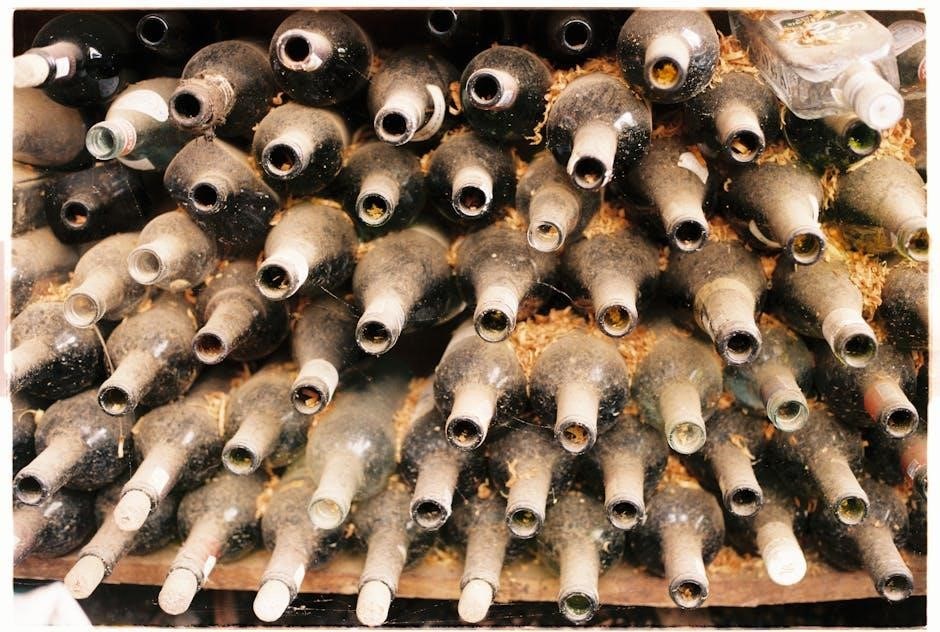
Legislative Framework and Compliance
The Wine Industry Award operates under the Fair Work Act, ensuring employers meet legal obligations for pay rates, record-keeping, and employee entitlements, maintaining industry standards and compliance․
6․1 Fair Work Act and Wine Industry Award Compliance
The Wine Industry Award must comply with the Fair Work Act, ensuring employers adhere to minimum pay rates, working conditions, and employee entitlements․ The Fair Work Act governs the award, providing a legal framework to protect workers’ rights and promote fair workplace practices․ Employers must follow the award’s terms to avoid penalties, while employees can rely on it for fair compensation and lawful treatment․ Compliance is monitored by the Fair Work Ombudsman․
6․2 Record-Keeping and Reporting Requirements
Employers in the wine industry must maintain accurate records of employees’ hours, pay rates, and leave entitlements, as mandated by the Wine Industry Award and the Fair Work Act․ These records ensure compliance with legal requirements and facilitate audits․ Employers must provide employees with pay slips and keep records for seven years․ Non-compliance can result in penalties, emphasizing the importance of transparent and meticulous record-keeping practices․
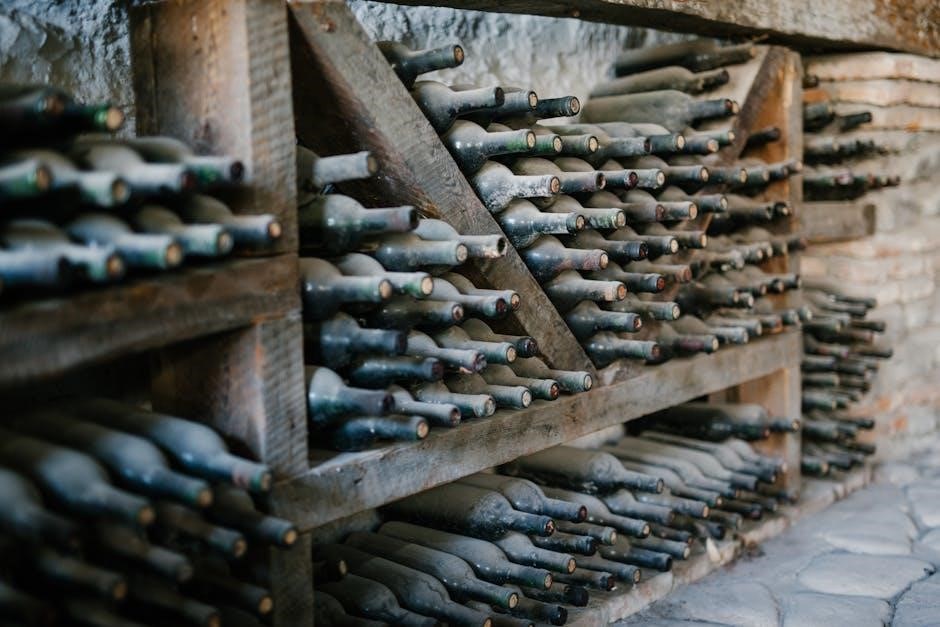
Pay Trends in the Wine Industry
The wine industry experiences fluctuating pay trends, influenced by market demand, regional variations, and economic conditions․ Current trends show rising wages for skilled roles like winemakers and vineyard managers․
7․1 Current Trends in Wine Industry Compensation
Current trends in wine industry compensation reflect varying pay rates based on role, experience, and location․ Vineyard workers and laborers typically earn lower wages, while winemakers and management roles see higher compensation․ Regional demand, market conditions, and industry growth also influence pay scales․ Increases in minimum wage rates and allowances are observed, aligning with economic factors and fair work standards․ These trends highlight the dynamic nature of compensation in the wine sector․
7․2 Future Predictions for Pay Rates
Future predictions for pay rates in the wine industry indicate gradual increases influenced by inflation, market demand, and industry growth․ Technological advancements may elevate salaries for specialized roles, while sustainability practices could shape compensation trends․ Regional variations will persist, with urban areas potentially seeing higher wage growth․ Employers are expected to adapt to these changes to remain competitive and ensure compliance with evolving labor standards and economic conditions․
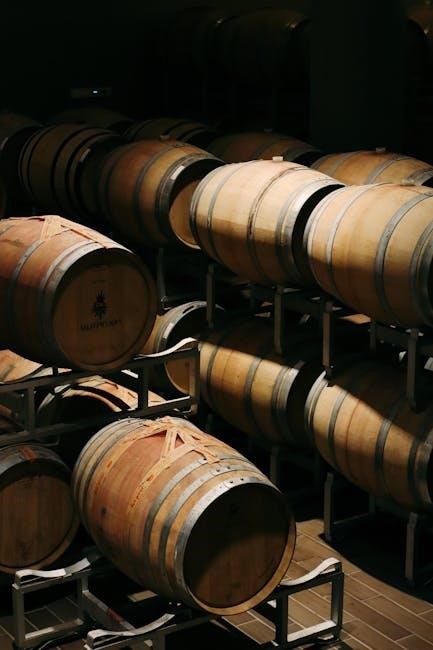
Minimum Wage and Award Updates
Annual wage reviews ensure fair pay adjustments, reflecting economic conditions and industry needs, while maintaining compliance with labor laws and supporting employers and employees alike effectively․
8․1 Annual Wage Reviews and Adjustments
Annual wage reviews ensure fair compensation by adjusting pay rates based on economic conditions, industry productivity, and cost of living․ These adjustments maintain the purchasing power of employees while considering employer capacity to pay․ The process involves consultations with stakeholders to balance competitiveness and fairness, ensuring compliance with labor laws and supporting sustainable growth in the wine industry․
8․2 Impact of Minimum Wage Changes on the Wine Industry
Minimum wage changes significantly influence the wine industry, affecting operational costs and profitability․ Employers may face increased expenses, potentially leading to adjustments in staffing, pricing, or investment in automation․ Employees benefit from higher earnings, improving their quality of life․ However, smaller wineries or vineyards with tight margins may struggle to absorb wage hikes, potentially impacting regional employment rates and industry competitiveness․ Compliance is crucial to maintain fair labor practices․
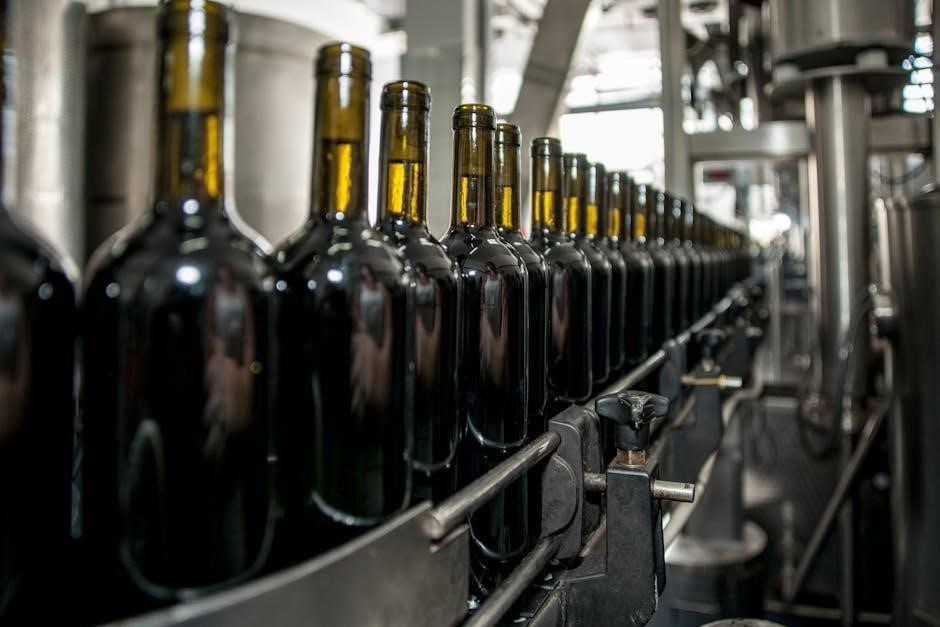
Non-Monetary Benefits and Allowances
The Wine Industry Award includes provisions for non-monetary benefits, such as leave entitlements, flexible work arrangements, and professional development opportunities, enhancing job satisfaction and work-life balance․
9․1Leave Entitlements and Flexible Work Arrangements
9․1 Leave Entitlements and Flexible Work Arrangements
The Wine Industry Award includes provisions for leave entitlements like annual, sick, and parental leave, ensuring employees get sufficient rest and family time․ Flexible work arrangements, such as adjusted hours or remote work, are supported to promote work-life balance and well-being․ These provisions enhance job satisfaction, comply with labor laws, and benefit employers and employees by improving productivity, retention, and overall job satisfaction in the wine sector․
9․2 Other Benefits and Allowances
Beyond monetary compensation, the Wine Industry Award offers additional benefits to enhance employee well-being․ These include meal allowances, tool allowances, and uniform reimbursements․ Some roles may also receive vehicle allowances or accommodation support․ Such provisions align with industry standards and aim to attract and retain skilled workers․ These benefits foster a positive work environment and ensure employees feel valued, contributing to overall job satisfaction and industry growth․

How the Wine Industry Award Impacts Businesses
The Wine Industry Award ensures fair wages and compliance, impacting businesses by streamlining payroll processes and promoting skilled labor attraction through regulated pay structures․
10․1 Compliance Requirements for Employers
Employers in the wine industry must adhere to the Wine Industry Award, ensuring fair pay rates, allowances, and overtime compensation․ Compliance involves maintaining accurate records of hours worked, leave entitlements, and payment details․ Employers must also stay updated on annual wage reviews and adjustments, as non-compliance can lead to penalties․ Understanding and implementing these requirements helps businesses avoid legal issues and foster a positive workplace environment․
- Record-keeping: Accurate documentation of employee hours and payments is mandatory․
- Fair Work Compliance: Employers must follow the Fair Work Act and related regulations to ensure lawful employment practices․
10․2 Strategies for Managing Payroll Costs
Employers can manage payroll costs by implementing efficient scheduling, monitoring overtime, and leveraging data analytics; Accurate record-keeping and regular audits help ensure compliance and prevent overpayments․ Additionally, offering flexible work arrangements and training programs can enhance productivity, reducing the need for excess labor․ By aligning payroll practices with business needs, employers can optimize costs while maintaining fair compensation and employee satisfaction․
- Data Analysis: Use tools to track labor costs and identify trends․
- Cost-Effective Scheduling: Plan shifts to minimize overtime and maximize efficiency․
The Wine Industry Award Pay Guide is a crucial resource for employers and employees, ensuring fair compensation and compliance with legal standards․ It is essential for staying informed about industry-specific pay regulations and updates․
11․1 Summary of Key Points
The Wine Industry Award Pay Guide outlines fair compensation standards, classifications, and allowances for wine sector employees․ It ensures compliance with legal requirements, providing clarity on minimum rates, overtime, and penalties․ Employers and employees benefit from understanding regional variations, experience-based pay, and market demands․ Regular updates and legislative frameworks ensure transparency and equity, making it a vital resource for navigating industry-specific pay regulations and future trends effectively․
11․2 Final Thoughts on the Wine Industry Award Pay Guide
The Wine Industry Award Pay Guide is a crucial resource for ensuring fair and transparent compensation in the wine sector․ It provides clear guidelines for employers and employees, promoting compliance and equity․ By understanding the classifications, pay rates, and allowances, businesses can navigate industry-specific challenges effectively; Staying informed about updates and changes is essential for maintaining compliance and fostering a fair workplace environment․




About the author